|
|
|
Sort Order |
|
|
|
Items / Page
|
|
|
|
|
|
|
| Srl | Item |
| 1 |
ID:
193223
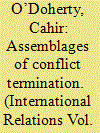

|
|
|
|
|
| Summary/Abstract |
The question of how wars end is of continued importance, especially in the context of the ongoing War on Terror. This question has traditionally been approached within International Relations through rational choice theories, logical modelling and game theory. Such approaches have become increasingly ill-suited to capturing the complexity and ambiguity of contemporary warfare and the War on Terror in particular. These battlefield ambiguities are often at odds with political and public desires to see decisive victory in wars. This article builds on recent critical work within War Termination Studies in order to re-conceptualise the end of war as assemblages. By paying greater attention to the affects inculcated by political rhetoric surrounding war and utilising the concepts of affect and emergence, this article presents a novel approach to the study of contemporary war termination. Utilising popular culture, increasingly seen as a crucial site of global politics, the case study analysed here advances the argument that sacrifice emerges from cinema and presidential rhetoric as a trope that allows leaders to claim victory in war despite indecisive conditions of the ground. Through affective cinematic encounters, conceptualised here through the end of wars assemblages, audiences can become more accepting of such political claims.
|
|
|
|
|
|
|
|
|
|
|
|
|
|
|
|
| 2 |
ID:
175700


|
|
|
|
|
| Summary/Abstract |
The emotional dimension of the human element of war remains understudied. This article explores war’s fundamental cognitive frame of mind, adversariality, with a focus on its emotional thread, in the context of battle and war termination. Adversariality itself is discussed with specific reference to Clausewitz before key emotional aspects—emotion causation and consequence, and stress, anger, and fear—are explored from the perspective of the emotions sciences literature. Finally, three brief historical cases demonstrate the importance of the emotional side of strategy: Königgratz campaign in 1866, Germany’s defensive campaign in 1918, and the War of the Spanish Succession.
|
|
|
|
|
|
|
|
|
|
|
|
|
|
|
|
| 3 |
ID:
096511
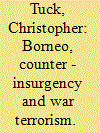

|
|
|
| 4 |
ID:
118973
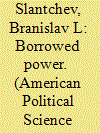

|
|
|
|
|
| Publication |
2012.
|
| Summary/Abstract |
Military expenditures are often funded by debt, and sovereign borrowers are more likely to renege on debt-service obligations if they lose a war than if they win one or if peace prevails. This makes expected debt service costlier in peace, which can affect both crisis bargaining and war termination. I analyze a complete-information model where players negotiate in the shadow of power, whose distribution depends on their mobilization levels, which can be funded partially by borrowing. I show that players can incur debts that are unsustainable in peace because the opponent is unwilling to grant the concessions necessary to service them without fighting. This explanation for war is not driven by commitment problems or informational asymmetries but by the debt-induced inefficiency of peace relative to war. War results from actions that eliminate the bargaining range rather than from inability to locate mutually acceptable deals in that range.
|
|
|
|
|
|
|
|
|
|
|
|
|
|
|
|
| 5 |
ID:
157586


|
|
|
|
|
| Summary/Abstract |
This article analyzes the length of interstate wars and the process of reaching a mutually acceptable bargaining solution. Rational choice scholarship has mainly sought to explain long wars in terms of commitment problems and private information. This article complements these rational choice perspectives by arguing that causal beliefs – a variable not considered by previous research – can also prolong wars by increasing expectations of battlefield performance and slowing down information updating. It illustrates the role of religiously based causal beliefs with the case of one of the longest interstate wars of modern time, the Iran–Iraq War of 1980–88. Even though commitment problems were present, they do not identify the root cause of Iran’s high expected utility of continuing the war, as religiously based causal beliefs played a more prominent role in prolonging the war. Religious causal beliefs constitute a real word mechanism that not only creates different priors about expected military capacity, but also slows down the process of updating beliefs, as battlefield events are not seen as credible information. Although the prevalence of religious conflicts has increased over time, the formation of beliefs and their effects on wars remains understudied when applying rational choice to real world conflicts.
|
|
|
|
|
|
|
|
|
|
|
|
|
|
|
|
| 6 |
ID:
127811
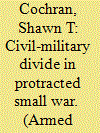

|
|
|
|
|
| Publication |
2014.
|
| Summary/Abstract |
This article examines the basis of military leadership preferences toward war termination, and thus the basis of the associated civil-military divide, within the context of protracted small war. The conventional wisdom posits military leadership preferences as a near-constant in favor of persistence and thus expects a dominant pattern of military obstructionism. However, such a pattern does not hold empirically across the population of small wars. This gap between expectation and evidence derives at least in part from the limits of the bureaucratic-organizational model, focused on the military's desire for resources, autonomy, and influence, that underlies the conventional wisdom. In contrast, this article suggests an alternative model privileging the demands of institutional legitimacy. The legitimacy motive as conceptualized here is particularly salient to the small war context. It accordingly provides a foundation for better understanding variation in military leadership preferences toward war termination and thus variation in the direction and intensity of the civil-military divide.
|
|
|
|
|
|
|
|
|
|
|
|
|
|
|
|
| 7 |
ID:
118181
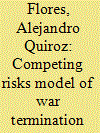

|
|
|
|
|
| Publication |
2012.
|
| Summary/Abstract |
Recent research suggesting that leader transitions increase the probability of war termination is based on the assumption that leader change is exogenous. However, the exogeneity of leader change needs to be tested, not assumed. This paper uses a bivariate discrete survival model to test the exogeneity of leader change and correctly estimate its partial effect on war termination. The paper extends the analysis by estimating a competing risks model of types of leader transitions. The evidence shows that leader change in large coalition systems never increases the probability of war termination, while leader change in small coalition systems never reduces the probability of war termination. In short, leader transitions in autocratic systems are more likely to bring interstate war to an end than leader transitions in democratic ones. The study also shows that the marginal effect of leader change fades away as the war progresses, and that war has negative duration-dependence.
|
|
|
|
|
|
|
|
|
|
|
|
|
|
|
|
| 8 |
ID:
126725
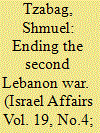

|
|
|
|
|
| Publication |
2013.
|
| Summary/Abstract |
The termination of the Second Lebanon War (2006) is among the most unusual in wars between Israel and Arab states. A classic example of an asymmetrical confrontation between a sovereign state and a guerrilla organization controlling part of a neighbouring state and operating against its will by means of terrorism, the war had far-reaching ramifications for Israeli decision makers in terms of defining the enemy and setting the termination goals of the conflict. In this respect great significance is attributed to the influence of the interface between the military and political echelons on formulating the war's termination strategy, especially in light of the high status enjoyed by the military in Israeli democracy.
|
|
|
|
|
|
|
|
|
|
|
|
|
|
|
|
| 9 |
ID:
091600
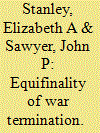

|
|
|
|
|
| Publication |
2009.
|
| Summary/Abstract |
The authors' theory contributes an alternative domestic politics pathway to traditional bargaining models of war termination. In bargaining models, the rational updating process that produces an overlapping bargaining space can develop a significant lag, which extends the war beyond a logical ending point. The authors posit that a change in the domestic governing coalition is often necessary to kick-start this updating process once it has become bogged down through preference, information, and entrapment obstacles. The authors demonstrate that domestic coalition shifts are a critical path to peace, using survival analysis techniques on Bennett and Stam's (1996) war-level data set of wars (1862-1990) and a new belligerent-level data set of wars (1945-2006). These tests show that because war policies can become institutionalized over time, there is a very strong link between coalition shifts and war termination.
|
|
|
|
|
|
|
|
|
|
|
|
|
|
|
|
| 10 |
ID:
024702
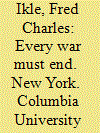

|
|
|
|
|
| Publication |
New York, Columbia University Press, 1971.
|
| Description |
viii, 160p.
|
| Standard Number |
0231034962
|
|
|
|
|
|
|
|
|
|
|
|
Copies: C:1/I:0,R:0,Q:0
Circulation
| Accession# | Call# | Current Location | Status | Policy | Location |
| 010359 | 327.172/IKL 010359 | Main | On Shelf | General | |
|
|
|
|
| 11 |
ID:
094704
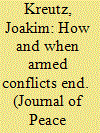

|
|
|
|
|
| Publication |
2010.
|
| Summary/Abstract |
This article presents new data on the start and end dates and the means of termination for armed conflicts, 1946-2005. These data contribute to quantitative research on conflict resolution and recurrence in three important respects: the data cover both interstate and intrastate armed conflicts, the data cover low-intensity conflicts, and the data provide information on a broad range of termination outcomes. In order to disaggregate the UCDP-PRIO Armed Conflict dataset into multiple analytical units, this dataset introduces the concept of conflict episodes, defined as years of continuous use of armed force in a conflict. Using these data, general trends and patterns are presented, showing that conflicts do not exclusively end with decisive outcomes such as victory or peace agreement but more often under unclear circumstances where fighting simply ceases. This pattern is consistent across different types of conflict, as is the finding that victories are more common in conflicts with short duration. The article then examines some factors that have been found to predict civil war recurrence and explores whether using the new dataset produces similar results. This exercise offers a number of interesting new insights and finds that the determinants for civil war recurrence identified in previous research are sensitive to alternate formulations of conflict termination data. The findings suggest that intrastate conflicts are less likely to recur after government victories or after the deployment of peacekeepers. If the previous conflict is fought with rebels aiming for total control over government or if the belligerents mobilized along ethnic lines, the risk of recurrence increases. The discrepancy in findings with previous research indicates the need for further study of conflict resolution and recurrence, for which this dataset will be useful.
|
|
|
|
|
|
|
|
|
|
|
|
|
|
|
|
| 12 |
ID:
114157


|
|
|
|
|
| Publication |
2012.
|
| Summary/Abstract |
This article argues that opposition political parties can play an important role in determining when and how a democracy exits a small war. Recent theoretical and empirical research on small wars has further uncovered the restrictions and constraints that democratic societies place on their government's war strategies. However, the mechanisms through which public opinion constrains and pressures government strategies have received relatively less academic attention. This article examines the role that opposition political parties play in providing an avenue through which society can shape foreign policy-namely, the exiting from small wars. It argues that opposition political parties can be instrumental in determining democracies' war termination in three ways: through 'elite cuing', applying electoral pressure, or winning an election and assuming government.
|
|
|
|
|
|
|
|
|
|
|
|
|
|
|
|
| 13 |
ID:
169105
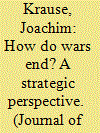

|
|
|
|
|
| Summary/Abstract |
This article gives an overview of the literature on war termination both in the fields of behaviouralism social sciences and policy-oriented strategic studies. It identifies shortcomings and problems related to both lines of research. The main problem is the undifferentiated and indiscriminate use of the term ‘war’. The article proposes a categorisation of wars that could form the basis for more thorough research on the topic of war termination.
|
|
|
|
|
|
|
|
|
|
|
|
|
|
|
|
| 14 |
ID:
107922


|
|
|
|
|
| Publication |
2011.
|
| Summary/Abstract |
The authors analyze a bargaining model of war that incorporates both commitment problems due to shifting power and asymmetric information. Four results emerge when both bargaining problems are present. First, in contrast to asymmetric information models, the resolution of uncertainty through fighting can lead to the continuation of war rather than its termination. Second, wars can be less-not more-likely to end in settlement the longer they last. Third, war aims increase over time as a belligerent becomes more confident that its opponent will grow unacceptably strong in the future. Finally, the dynamics that characterize wars in purely asymmetric information or commitment models should exist only when the other factor is absent.
|
|
|
|
|
|
|
|
|
|
|
|
|
|
|
|
| 15 |
ID:
130660
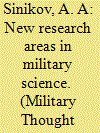

|
|
|
|
|
| Publication |
2014.
|
| Summary/Abstract |
The article examines trends in military science that use field categories borrowed from conflict and crisis studies. Topics discussed include the differentiation between military science as a field of study to military conflict studies, the inventory of theories included in military science, origins of the view that military conflict is more general than war. It cites trends in military conflicts that can serve as grounds for formulating scientific regularities in the course of research.
|
|
|
|
|
|
|
|
|
|
|
|
|
|
|
|
| 16 |
ID:
074100
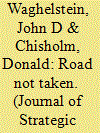

|
|
|
|
|
| Publication |
2006.
|
| Summary/Abstract |
Irrespective our views on the rationality of our opponent's continuing to conduct operations against us, unless utterly extirpated, he retains a vote on when and how conflict will end. This is because war is about power - compelling another actor to do something he would not otherwise do, or to cease doing something he would otherwise prefer to do. In planning for conflict termination we should account for the peculiarities of opponents who may decide not to quit when we have beat them fair and square. We do not desire that they cease conventional fighting, but that they cease fighting altogether.
|
|
|
|
|
|
|
|
|
|
|
|
|
|
|
|
| 17 |
ID:
084028
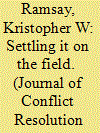

|
|
|
|
|
| Publication |
2008.
|
| Summary/Abstract |
Using a sample of battlefield data from twentieth-century wars, the author of this article tests a number of previously untested hypotheses linking battle events and the decision to end violent conflict. The author explores how factors like the distribution of power, battlefield casualties, and information that flows from the battlefield influence war termination. The analysis speaks to the validity of competing rational choice theories of war termination.
|
|
|
|
|
|
|
|
|
|
|
|
|
|
|
|
| 18 |
ID:
169108
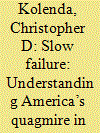

|
|
|
|
|
| Summary/Abstract |
The United States government has no organised way of thinking about war termination other than seeking decisive military victory. This implicit assumption is inducing three major errors. First, the United States tends to select military-centric strategies that have low probabilities of success. Second, the United States is slow to modify losing or ineffective strategies due to cognitive obstacles, internal frictions, and patron-client challenges with the host nation government. Finally, as the U.S. government tires of the war and elects to withdraw, bargaining asymmetries prevent successful transitions (building the host nation to win on its own) or negotiations.
|
|
|
|
|
|
|
|
|
|
|
|
|
|
|
|
| 19 |
ID:
172835
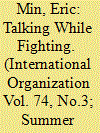

|
|
|
|
|
| Summary/Abstract |
Contemporary studies of conflict have adopted approaches that minimize the importance of negotiation during war or treat it as a constant and mechanical activity. This is strongly related to the lack of systematic data that track and illustrate the complex nature of wartime diplomacy. I address these issues by creating and exploring a new daily-level data set of negotiations in all interstate wars from 1816 to the present. I find strong indications that post-1945 wars feature more frequent negotiations and that these negotiations are far less predictive of war termination. Evidence suggests that increased international pressures for peace and stability after World War II, especially emanating from nuclear weapons and international alliances, account for this trend. These original data and insights establish a dynamic research agenda that enables a more policy-relevant study of conflict management, highlights a historical angle to conflict resolution, and speaks to the utility of viewing diplomacy as an essential dimension to understanding war.
|
|
|
|
|
|
|
|
|
|
|
|
|
|
|
|
| 20 |
ID:
163755


|
|
|
|
|
| Summary/Abstract |
What factors determine how China attempts to terminate armed conflict? This article derives from the war termination literature three factors that impact the ability of disputants to resolve conflicts: approach to wartime diplomacy, views on escalation, and receptiveness to mediation. I then evaluate China’s attempts to bring conflict to a close according to these three factors in the Korean War, Sino-Indian War, and Sino-Vietnamese War. I argue that China tends to entertain talks only with weaker opponents, rely on heavy escalation to bring about peace, and leverage outside parties less as empowered mediators and more as an additional source of pressure on its enemies. A subsequent analysis of authoritative Chinese strategic writings reveal that these patterns have been imbued in contemporary thought and, therefore, are likely to persist in future flashpoints. My findings add a new dimension to the war termination literature and have policy implications for regional peace and stability.
|
|
|
|
|
|
|
|
|
|
|
|
|
|
|
|
|
|
|
|
|